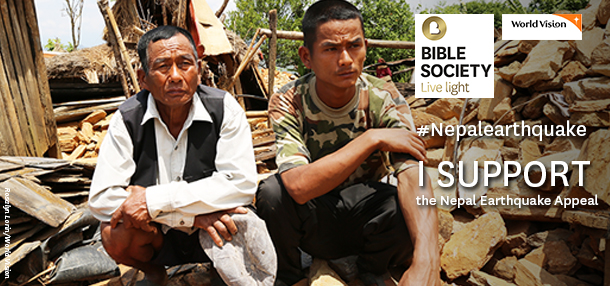With fatalities climbing to 7365 and 14,355 injured after the devastating earthquake in Nepal, aid organisations are “fighting against the clock” to provide enough emergency shelter, food and infrastructure before the coming monsoon season, according to the United Nations.
Over 600,000 houses have been destroyed or damaged and the UN says 8 million people have been affected (of Nepal’s 28 million population). At least 2 million people will need tents, water, food and medicines over the next three months.
Nepal’s tragedy is on a “terrible, terrible” scale that demands an accelerated emergency response from the international community, says Tim Costello, director of World Vision Australia, who is leading the Australian aid effort on the ground in Nepal.
“The scenes that have greeted us here are absolutely devastating,” says Mr Costello, who travelled to Nepal last week to assess the extent of the disaster. “The refrain we keep hearing from the survivors is ‘where is the help, where is the help?’ Many of the injured have since perished or are now experiencing secondary medical complications. There are reports of local doctors forced to perform amputations without anaesthetic in order to save lives.”
Mr Costello said World Vision had distributed all of its in-country stockpiles and was waiting for planes with relief supplies to get in. A triage system was being used to cope with the volumes of desperate people trying to get out and aid organisations trying to get cargo in through the “very narrow funnel” of the international airport.
Survivors describe the government as “invisible”, saying they paid for their own tarpaulins, food and water. “I think the commitment, organisation and just know-how of the international community is what’s needed for people like that,” Mr Costello says. “The emergency response needs to be sped up … the size and scope of this is far greater than the capacity at the moment. Having arrived and seen this for myself I’m thinking ‘this is too slow’. However, no one is to blame.”
Speaking from the World Vision HQ in Kathmandu late last week with rubble around him and relief operations going on behind him, Mr Costello said many of the 200 World Vision staff had lost their houses and were sleeping under tarpaulins and then turning up and distributing food, clean water, tarpaulins and medical kits to other desperate people.
“This is an almighty disaster,” he says. “For 20 years they’ve been saying in Nepal and that big one will come. Well, now that the big one has come … with so many people dead and in the region still missing, to be here and to be a Christian organisation helping is a rare privilege and a statement of the gospel.”
Other Christian organisations are also responding to the disaster, including TEAR Australia, Baptist World Aid, Caritas Australia and International Nepal Fellowship. TEAR Australia is working in partnership with United Mission to Nepal, who have asked for the prayer: “Pray that families in Nepal will find the strength to cope with their intense emotional, physical and spiritual suffering.”
Bible Society Australia announced this week they are joining with World Vision to support the enormous recovery effort. Bible Society’s CEO Dr Greg Clarke said that in times of crisis the Bible is an important source of comfort. The Bible Society has an office in Nepal, and staff there have been overwhelmed by requests for scriptures – replacing thousands of Bibles that have been lost in rubble and providing materials to help Christians and seekers on the ground in Nepal to find God in the suffering.
“In times of disasters, people’s immediate physical needs are very obvious. We just have to help. But we mustn’t forget their hearts and souls, in desperate need of encouragement, and that’s why we are responding to Nepal Bible Society’s request to supply emergency Scriptures. They need comfort and hope,” Dr Clarke told Eternity.
“By partnering, World Vision Australia and Bible Society Australia are endeavouring to help Nepalese people in body and soul. They have asked for both kinds of aid.”
“It is a beautiful thing to see words of hope and gifts of practical care going together to the poor suffering people of Nepal. It’s how Christian love should work.”
About 500 Christians are feared to have been killed by falling masonry as they attended noon church services during the April 25 earthquake, according to AsiaNews. The 7.8-magnitude quake struck at 11.56 am, when many Nepalese churches were conducting their Saturday worship services.
“Many Christians were buried while they were worshipping on the Sabbath and died,” the president of the Seventh-day Adventist Church in Nepal, Umesh Pokharel, told Adventist Review.
A network of Nepal churches estimated about 200 were killed in Dhadhing, near the quake centre, 100 in Kathmandu, and 200 in other areas. Christians comprise between 1 and 3 per cent of the 30 million population of Nepal.
“It is mainly a Hindu country with Zen Buddhists and a small Christian community,” notes Mr Costello. “So when they say ‘but you’re a Christian organisation’, I’m very proud to say ‘Well, Jesus didn’t say just to love Christians – we love everyone’.”
Here is a list of Australian Christian organisations with current appeals for the Nepal emergency response:
-World Vision
-International Nepal Fellowship
-TEAR Australia
-Caritas Australia
-Baptist World Aid
-Bible Society Australia
Email This Story
Why not send this to a friend?




